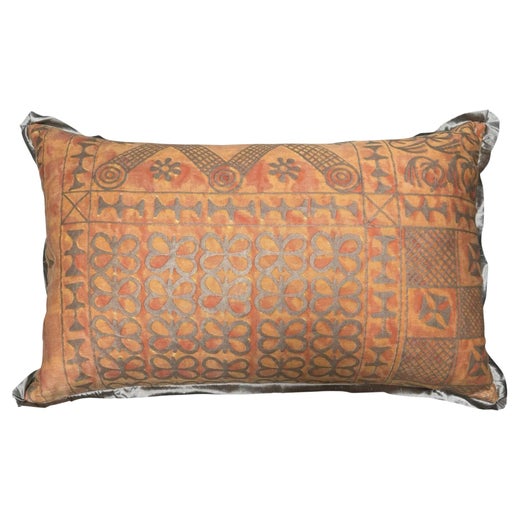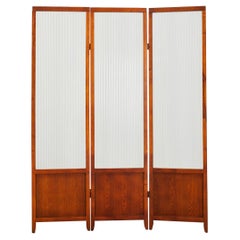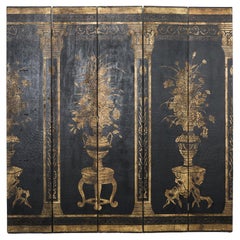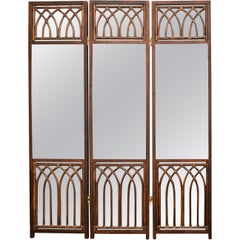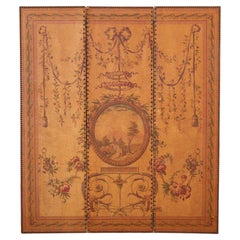Fortuny Upholstered Five Panel Folding Screen Room Divider
About the Item
- Creator:Fortuny (Maker)
- Dimensions:Height: 81.5 in (207.01 cm)Width: 90.5 in (229.87 cm)Depth: 1.5 in (3.81 cm)
- Style:Baroque (In the Style Of)
- Materials and Techniques:
- Place of Origin:
- Period:
- Date of Manufacture:20th Century
- Condition:Wear consistent with age and use. Beautifully crafted with strong joinery. Age appropriate wear, light stains, and light fading as seen in photos.
- Seller Location:Rio Vista, CA
- Reference Number:1stDibs: LU1555230232092
Fortuny
Spanish fashion designer Mariano Fortuny was an innovator in the world of textile design. He drew on classical Greek tunics for his rich and interesting garments and worked with a revolutionary system for creating pleats. He designed a range of clothing for his couture house, and today, vintage Fortuny evening gowns, gemstone-colored day dresses, coats and accessories like drawstring bags are known for their fine craftsmanship and signature elegance.
Fortuny was a true artist who worked with beautiful fabrics as his medium of choice. Although he showed talent in painting, sculpting, photography and architecture at an early age, fashion was where he really shined.
Fortuny was born Mariano Fortuny y Madrazo in 1871 in Granada, into a family of artists. His father died when Fortuny was only three years old, and his mother moved the family to Paris. As a child, Fortuny was fond of experimenting and figuring out how things worked. He even dyed pieces of fabric from his family's textile collection, which had been amassed from shops around Europe.
In 1889, the family moved again, this time to Venice. Here, Fortuny found inspiration in the past, which would influence his future designs. Not long after, the young Fortuny set off to travel the continent. In 1897, he visited Paris and fell in love with a dressmaker named Henriette Negrin. She became his muse, his wife and his creative partner — Negrin worked with Fortuny on clothing designs and fabrics — and the two settled in the French capital.
A lifelong inventor, Fortuny began patenting his creations in 1901. By 1934, he had registered more than 20 patents. At the same time, his fashion career was taking off.
In 1907, he designed the Delphos gown with Negrin, which French novelist and essayist Marcel Proust described as "faithfully antique but markedly original." Fortuny had worked from his home until 1922 when increased demand required large-scale production. He opened a factory in Venice, where due to the scarcity of silk, he began experimenting with cotton.
In 1927, New York interior designer Elsie McNeill traveled to Paris to meet Fortuny and became his exclusive American distributor. She returned to the United States and introduced Fortuny's designs to New World audiences. Shops opened in Paris, New York and London. Toward the end of the 1930s, Fortuny returned to painting and stepped away from the busy fashion industry.
After Fortuny passed away in 1949, McNeill took over the label and continued running it until 1988, when it was purchased by the Riad family, who remain at the helm of Fortuny today.
On 1stDibs, find vintage Fortuny clothing and accessories.

Erin Lane Estate is based in the San Francisco Bay Area, and its team of furniture restorers, art curators, professional appraisers and Asia specialists sources prime vintage and antique furniture from the finest estates in Northern and Southern California. Erin Lane Estate specializes in Hollywood Regency, McGuire, Chinese and Japanese pieces.
You May Also Like
Vintage 1960s French Louis XIII Screens and Room Dividers
Glass
Vintage 1950s American Screens and Room Dividers
Rattan
Vintage 1950s French Screens and Room Dividers
Wood
Antique 19th Century French Provincial Screens and Room Dividers
Giltwood
Vintage 1950s Mexican Mid-Century Modern Screens and Room Dividers
Brass
Vintage 1980s Chinoiserie Screens and Room Dividers
Wood
Vintage 1950s Mid-Century Modern Screens and Room Dividers
Linen
Vintage 1960s Swedish Scandinavian Modern Screens and Room Dividers
Pine
Vintage 1960s Swedish Scandinavian Modern Screens and Room Dividers
Pine
Mid-20th Century Chinese Screens and Room Dividers
Wood, Lacquer, Paint
More From This Seller
View All20th Century American Art Deco Screens and Room Dividers
Metal
20th Century Chinese Neoclassical Screens and Room Dividers
Canvas, Wood
20th Century American Organic Modern Floor Mirrors and Full-Length Mirrors
Brass
20th Century English Neoclassical Screens and Room Dividers
Brass
20th Century Italian Neoclassical Screens and Room Dividers
Brass
20th Century Chinese Chinese Export Paintings and Screens
Brass
